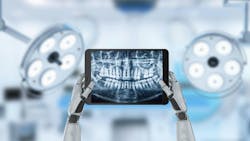The AI dental assistant: How AI agents improve patient experience
What you'll learn in this article
-
How artificial intelligence in dentistry improves diagnostics, treatment planning, and practice management
-
Ways AI dental technology enhances patient experience with stress reduction, efficient scheduling, and personalized care
-
The future of AI in dental practices, including ethical considerations, data security, and industry innovations
Artificial intelligence (AI) is reshaping the world by automating repetitive tasks to free humans to make important decisions, and by providing key insights to make those decisions safer and faster. Health care is benefiting from AI in a huge way, as these cutting-edge systems can diagnose patients, develop treatment plans, and improve patient outcomes in any field of medicine—including dentistry. Many dental offices have already implemented AI functionality into their practices, making visits easier, more efficient, and more enjoyable for practitioners and patients alike. It’s worth exploring how ongoing innovations in AI will enhance the dental patient experience moving forward.
The evolution of AI in dentistry
Dentistry, like all fields of medicine, has always been highly dependent on technological advancement. From inventions like amalgam and dentures in the 19th century, through the pneumatic high-speed drill in 1949, to micro-osteoperforation in 2010, innovators are constantly improving the lives of doctors and patients.
Data mining first helped Finnish scientists in 2010 predict how long various dental materials would last. In 2024, a robot developed by Perceptive performed the first AI-driven dental procedure on a human being.1 While robot dentists may not be available to every practice any time soon, most dental offices are already making use of AI in imaging, diagnostic, and administrative roles.
The potential of AI dental assistants
While AI agents performing dental procedures are certainly headline-worthy, the most useful day-to-day function of AI is to improve productivity and work-life balance for the people who manage dental practices. By automating the necessary but repetitive and detail-oriented tasks in any workplace, AI assistants can free humans to focus on the important work that people find most useful and satisfying.
Such a platform could drastically improve the precision of diagnostics, such as x-ray analysis and cavity detection, and develop treatment plans with procedures guided by machine learning. When integrated into a dental office’s best practices, an AI dental assistant can dramatically reduce the time that front-desk staff spend on repetitive work while helping them perform those tasks faster and more accurately. Administrative staff would be free to focus on patient interaction and scheduling, which would be dramatically more time efficient and effective with aid from AI-driven systems.
Enhancing patient experience with AI
It’s no secret that going to the dentist can be stressful. Patient anxiety remains a major challenge for dentists and is still being studied extensively in academic settings.2 An AI-driven dental assistant platform can dramatically ease the appointment process for patients, from scheduling through outpatient procedures, reducing their stress levels. If scheduling an appointment is effortless, and appointments themselves are faster and smoother, patients will have a much less stressful experience overall.
These systems can dramatically reduce wait times with more efficient scheduling and faster, AI-assisted completions on every procedure. Automated patient interactions can be personalized to offer a patient experience that considers everyone’s unique needs and preferences, and sends reminders as needed. Patients with a history of skipping or missing appointments could receive different scheduling reminders than patients who are more reliable or new patients, with data and analytics improving the system’s performance over time.
Even better, new advancements in machine learning allow AI systems to offer patients key anxiety--reduction techniques and provide education to help understand the process the dentist is performing. All these capabilities will make visiting the dentist less stressful and help doctors work with calmer, less anxious patients.
Challenges and ethical considerations
As soon as AI hit the mainstream a few years ago, concerned voices throughout the scientific, business, and public communities spoke up about the potential pitfalls that make this technology worth pursuing—especially when it comes to human health and safety.
When considering the dangers of AI, people often go straight to the sci-fi scenario of “what happens if that robot dentist malfunctions midprocedure,” but much less dramatic mistakes could be just as dangerous. What if an AI-driven scheduling or treatment planning system works with the wrong data and allows a patient to receive pain medication or even fillings they're allergic to?
But even without considering patient safety, privacy and data security remain an issue because machine learning and large language models are built on integrating available data, in a world where data leaks and hacks are a fact of life. Likewise, all the ways AI can soothe patient anxieties can be undermined if dentists replace human interactions entirely with AI chatbots.
The future of AI in dentistry
Despite these concerns, a responsible and cautious approach to AI integration can drive dental care to new benchmarks in patient care and, as time and innovation march along, create a seamless and flexible treatment process. AI-powered tools will turn time spent on routine administrative tasks into more time helping and connecting with patients, who in turn receive faster, bespoke service in a less stressful environment.
AI will increasingly make any dental practice more productive, successful, and efficient with its existing resources, and empower staff members to make faster, better-informed choices. And of course, those exciting AI agents that safely perform routine dental procedures will be a fixture in any dentist’s office.
Embrace innovation
AI is taking nearly every industry by storm, reshaping the way people approach every aspect of their work. By integrating AI into their best practices, administrative tasks, and patient interactions, any dental office can boost productivity and satisfaction for patients, administrative staff, and dental practitioners alike.
An AI-powered dental assistant can take the routine and repetitive tasks off the plates of valuable human teammates, make visits to the dentist less stressful, and help plan the ideal treatment regimen based on ever more accurate imaging analytics. The more research performed in improving AI-driven systems and the more care taken in ethically adopting these tools, the better the outcomes will be throughout the dental field.
Editor's note: This article appeared in the September 2025 print edition of Dental Economics magazine. Dentists in North America are eligible for a complimentary print subscription. Sign up here.
References
- Perceptive completes world’s first fully automated dental procedure on a human using AI-driven robotic system. News release. Perceptive. July 30, 2024. https://www.businesswire.com/news/home/20240730980575/en/Perceptive-Completes-Worlds-First-Fully-Automated-Dental-Procedure-on-a-Human-Using-AI-Driven-Robotic-System
- Winkler CH, Bjelopavlovic M, Lehmann KM, Petrowski K, Irmscher L, Berth H. Impact of dental anxiety on dental care routine and oral-health-related quality of life in a German adult population—a cross-sectional study. J Clin Med. 2023;12(16):5291. doi:10.3390/jcm12165291
About the Author

Burhan Syed
Burhan Syed is the CEO and cofounder of Rondah AI, a company specializing in AI receptionists for dental service organizations. Prior to this role, Burhan grew multiple businesses at Six Social, Resolver, and Fundsquire and holds a degree in business administration with a focus on finance from Western University.
